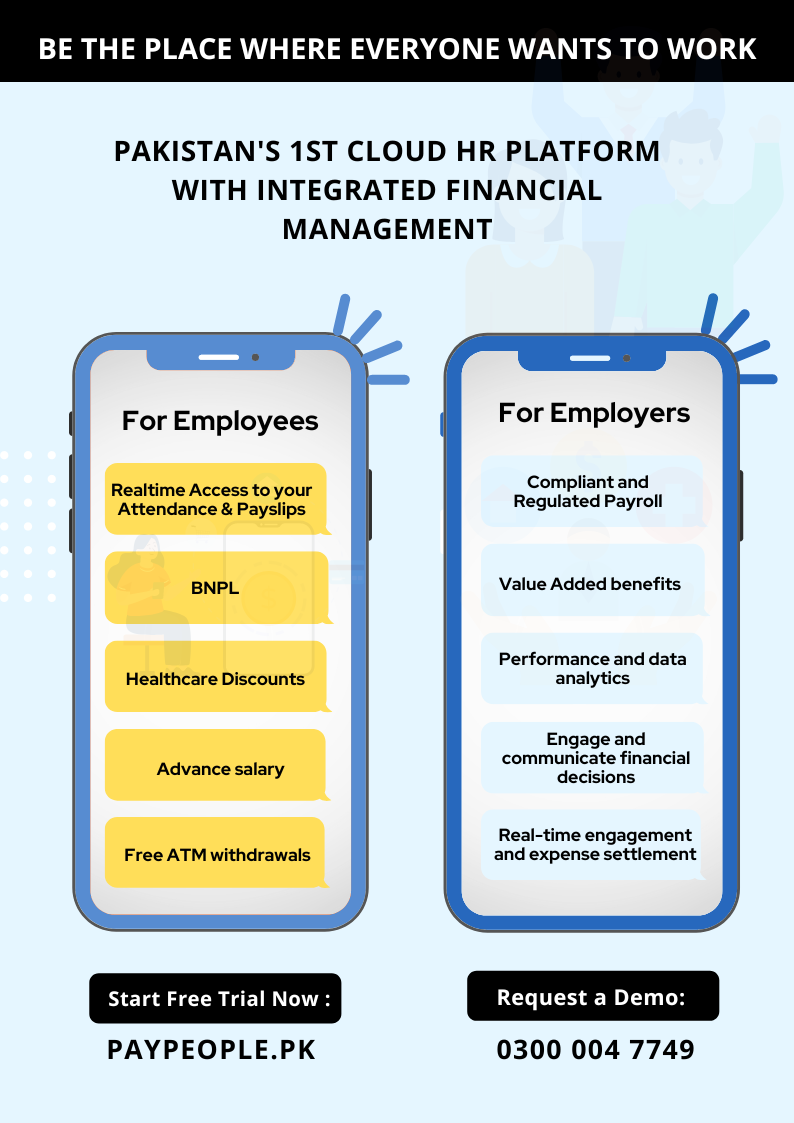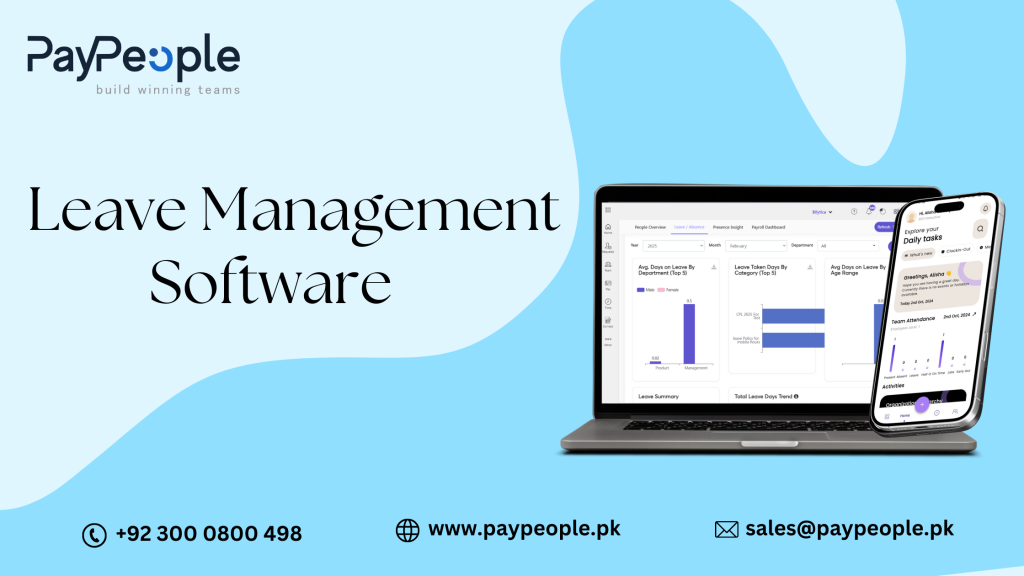Paypeople # 1 is one of the top HRMS in Pakistan crucial for the smooth functioning of an organization. HRMS securely stores and manages sensitive employee information, such as personal details, payroll, benefits, and performance records. Maintaining data security and confidentiality is of paramount importance in any HRMS. In this article, we will explore seven reasons why data in an HRMS is secure and confidential.
Click to Start Whatsapp Chat with Sales
Call #:+923000507555
Email: sales@bilytica.com
Paypeople # 1 HRMS in Pakistan

Access Control:
One of the primary reasons data in an HRMS in Pakistan is secure and confidential is because of robust access control mechanisms. Only authorized personnel, such as HR managers and system administrators, are granted access to the system. Access rights can further be restricted based on employee roles and responsibilities. This helps prevent unauthorized access and limits potential risks posed by internal and external threats.
Encryption:
Data encryption is another key aspect of ensuring data security in an HRMS. Encryption transforms data into an unreadable format, which can only be decrypted using a decryption key. This makes it extremely difficult for unauthorized individuals to decipher and misuse sensitive employee information. Strong encryption algorithms are used to safeguard data during transmission and storage, adding an extra layer of protection.
Firewalls and Intrusion Detection Systems:
HRMS in Pakistan platforms employ firewalls and IDS to prevent unauthorized access and protect against external threats. Firewalls act as a barrier between the HRMS and the internet, monitoring and filtering traffic to prevent malicious activity. IDS constantly monitors network traffic, detects unusual patterns, and immediately raises an alarm if any suspicious activity is detected. This proactive defense mechanism helps maintain data confidentiality and minimize the risk of unauthorized access.

Regular Security Audits:
To ensure continued data security and confidentiality, Payroll Software in Lahore providers conduct regular security audits. These audits evaluate the system’s security architecture, penetration testing, vulnerability assessment, and compliance with industry standards and regulations. By identifying any potential security gaps or vulnerabilities, necessary patches or updates can be implemented promptly to maintain the integrity of the HRMS.
Backup and Disaster Recovery:
HRMS platforms often include robust backup and disaster recovery mechanisms to protect against data loss and ensure business continuity. Regular backups are scheduled to create copies of data, which are securely stored in separate locations. In the event of system failures, data can be easily restored, minimizing downtime and potential loss of confidential information. Such measures provide an additional layer of security against accidental data deletion or disasters.
Employee Training and Awareness:
Maintaining data security and confidentiality requires active participation from employees. Recruitment software in Islamabad departments plays a crucial role in conducting regular training sessions to raise employee awareness about the importance of data security. Employees are educated about best practices, such as strong password management, avoiding phishing attempts, and responsible handling of sensitive information. By ensuring employees are well-informed about data security measures, organizations can mitigate potential risks arising from unintentional errors or negligence.
Regulatory Compliance:
HRMS platforms are designed to adhere to various data protection and privacy regulations. Compliance with regulations, such as GDPR, ensures that sensitive employee information is handled securely and confidentially. The HRMS providers have dedicated legal teams that continuously monitor and implement necessary changes to stay in line with evolving regulations. Meeting regulatory requirements not only protects the organization from legal consequences but also reassures employees that their data is handled with care.
Conclusion
In conclusion, data in an HRMS is secure and confidential due to various security measures in place. Strict access controls, encryption, firewalls, intrusion detection systems, regular security audits, backup and disaster recovery mechanisms, employee training, and regulatory compliance all contribute to maintaining the security and confidentiality of employee information. Organizations must carefully select and implement an HRMS that prioritizes data protection to ensure the trust and confidence of their employees.
Click to Start Whatsapp Chat with Sales
Call #:+923000507555
Email: sales@bilytica.com
HRMS in Pakistan
HRMS in Pakistan
HRMS in Pakistan
HRMS in Pakistan
We are one of the best Is data in an HRMS in Pakistan secure and confidential? Price in Pakistan in Azad Kashmir, Bagh, Bhimber, khuiratta, Kotli, Mangla, Mirpur, Muzaffarabad, Plandri, Rawalakot, Punch, Balochistan, Amir Chah, Bazdar, Bela, Bellpat, Bagh, Burj, Chagai, Chah Sandan, Chakku, Chaman, Chhatr, updated on 2025-07-05T23:54:01+05:00 Dalbandin, Dera BugtiBarcode Shop offer lowest Is data in an HRMS in Pakistan secure and confidential? Price Face Recognition in cities Dhana Sar, Diwana, Duki, Dushi, Duzab, Gajar, Gandava, Garhi Khairo, Garruck, Ghazluna, Girdan, Gulistan, Gwadar, Gwash, Hab Chauki, Hameedabad, Harnai, Hinglaj, Hoshab, Ispikan, Jhal, Jhal Jhao, Jhatpat, Jiwani, Kalandi, Kalat, Kamararod, Kanak, Kandi, Kanpur, Kapip, KapparWe can deliver Face Recognition in Karodi, Katuri, Kharan, Khuzdar, Kikki, updated on 2025-07-05T23:54:01+05:00 Kohan, Kohlu, Korak, Lahri, Lasbela, Liari, Loralai, Mach, Mand, Manguchar, Mashki Chah, Maslti, Mastung, Mekhtar, Merui, Mianez, Murgha Kibzai, Musa Khel Bazar, Nagha Kalat, Nal, Naseerabad, Nauroz Kalat, Nur Gamma, Nushki, Nuttal, Ormara, Palantuk, Panjgur, Pasni, Piharak, Pishin, Qamruddin Karez, Qila Abdullah, Qila Ladgasht and this was updated on 2025-07-05T23:54:01+05:00
We also deal with Is data in an HRMS in Pakistan secure and confidential? Price in Qila Safed, Qila Saifullah, Quetta, Rakhni, Robat Thana, Rodkhan, Saindak, Sanjawi, Saruna, Shabaz Kalat, Shahpur, Sharam Jogizai, Shingar, Shorap, Sibi, Sonmiani, Spezand, Spintangi, Sui, Suntsar, Surab, Thalo, Tump, Turbat, Umarao, pirMahal, Uthal, Vitakri, Wadh, Washap, Wasjuk, Yakmach, Zhob, Federally Administered Northern Areas/FANAWe are already sent Face Recognition to these places – Astor, updated on 2025-07-05T23:54:01+05:00 Baramula, Hunza, Gilgit, Nagar, Skardu, Shangrila, Shandur, Federally Administered Tribal Areas/FATA, Bajaur, Hangu, Malakand, Miram Shah, Mohmand, Khyber, Kurram, North Waziristan, South Waziristan, Wana, NWFP, Abbottabad, Ayubia, Adezai, Banda Daud Shah, Bannu, Batagram, Birote, Buner, Chakdara, Charsadda, Chitral, Dargai, Darya Khan, Dera Ismail Khan and this was updated on 2025-07-05T23:54:01+05:00
we are planning to open a branch office of in Drasan, Drosh, Hangu, Haripur, Kalam, Karak, Khanaspur, Kohat, Kohistan, Lakki Marwat, Latamber, Lower Dir, Madyan, Malakand, Mansehra, Mardan, updated on 2025-07-05T23:54:01+05:00 Mastuj, Mongora, Nowshera, Paharpur, Peshawar, Saidu Sharif, Shangla, Sakesar, Swabi, Swat, Tangi, Tank, Thall, Tordher, Upper Dir, Punjab, Ahmedpur East, Ahmed Nager Chatha, Ali Pur, Arifwala, Attock, Basti Malook, BhagalchurFace Recognition in Bhalwal, Bahawalnagar, Bahawalpur, Bhaipheru, Bhakkar, Burewala, Chailianwala, Chakwal, Chichawatni, Chiniot, Chowk Azam, Chowk Sarwar Shaheed, Daska, Darya Khan, Dera Ghazi Khan, Derawar Fort, updated on 2025-07-05T23:54:01+05:00 Dhaular, Dina City, Dinga, Dipalpur, Faisalabad, Fateh Jang, Gadar, Ghakhar MandiFace Recognition Is data in an HRMS in Pakistan secure and confidential? Price s Demands very high in Gujranwala, Gujrat, Gujar Khan, Hafizabad, Haroonabad, Hasilpur, Haveli Lakha, Jampur, Jhang, Jhelum, Kalabagh, Karor Lal Esan, Kasur, Kamalia, Kamokey, Khanewal, Khanpur, Kharian, Khushab, Kot Addu, Jahania, Jalla Araain, Jauharabad, Laar, Lahore, Lalamusa, Layyah, Lodhran, Mamoori, Mandi Bahauddin, Makhdoom Aali, Mandi Warburton, Mailsi, Mian Channu, Minawala, Mianwali, Multan, Murree, Muridke, Muzaffargarh, Narowal, Okara, Renala Khurd, Rajan Pur, Pak Pattan, Panjgur and this was updated on 2025-07-05T23:54:01+05:00 and current Is data in an HRMS in Pakistan secure and confidential? Price of is Rs 100 in Pattoki, Pirmahal, Qila Didar Singh, Rabwah, Raiwind, Rajan Pur, Rahim Yar Khan, Rawalpindi, Rohri, Sadiqabad, Safdar Abad – (Dhaban Singh), Sahiwal, Sangla Hill, Samberial, Sarai Alamgir, Sargodha, Shakargarh, Shafqat Shaheed Chowk, Sheikhupura, Sialkot, Sohawa, Sooianwala, Sundar (city), Talagang, Tarbela, Takhtbai, Taxila, Toba Tek Singh, Vehari, Wah Cantonment, Wazirabad and this was updated on 2025-07-05T23:54:01+05:00
Software solutions are widely available with Price updated on 2025-07-05T23:54:01+05:00 in Sindh, Ali Bandar, Baden, Chachro, Dadu, Digri, Diplo, Dokri, Gadra, Ghanian, Ghauspur, Ghotki, Hala, Hyderabad, Islamkot, Jacobabad, Jamesabad, Jamshoro, Janghar, Jati (Mughalbhin), Jhudo, Jungshahi, Kandiaro, Lahore, Kashmor, Keti Bandar, Khairpur, updated on 2025-07-05T23:54:01+05:00 Khora, Klupro, Khokhropur, Korangi, Kotri, Kot Sarae, Larkana, Lund, Mathi, Matiari, Mehar, Mirpur Batoro, Mirpur Khas, Mirpur Sakro, updated on 2025-07-05T23:54:01+05:00 Mithi, MithaniThe Barcode Shop deliver high quality Face Recognition in updated on 2025-07-05T23:54:01+05:00 Moro, Nagar Parkar, Naushara, Naudero, Noushero Feroz, Nawabshah, Nazimabad, Naokot, Pendoo, Pokran, Qambar, Qazi Ahmad, Ranipur, Ratodero, Rohri, Saidu Sharif, Sakrand, Sanghar, Shadadkhot, Shahbandar, Shahdadpur, Shahpur Chakar, Shikarpur, Sujawal, Sukkur, Tando Adam, Tando Allahyar, Tando Bago, Tar Ahamd Rind, Thatta, Tujal, Umarkot, Veirwaro, Warah and this was updated on 2025-07-05T23:54:01+05:00
26-10-2023


